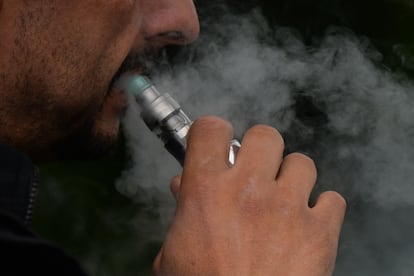Illegal and dangerous: Mexico bans vaping
Amid health alerts and smuggling concerns, President Andrés Manuel López Obrador decrees a total prohibition on alternative tobacco products


The President of Mexico, Andrés Manuel López Obrador (popularly known by his initials AMLO), signed a decree on Tuesday that prohibits the “circulation and marketing” of electronic cigarettes or vaping devices as well as tobacco heaters. Combined with the passing of a General Import and Export Tax Law earlier this month, these products are now banned from being imported and sold within the country.
The decision also follows a maximum health alert issued by the country’s federal health risks commission, which declared that all alternative tobacco smoking products can cause major illness. Federal and local authorities have launched several campaigns to locate and seize these devices in at least a dozen states.
The health alerts and legal measures have prompted a debate about vaping devices that are being smuggled into the country. During the Senate debate about the tax law, Senator Luis Ortiz proposed regulating the market, saying that distribution is being left to the black market in the absence of companies being able to import the products and pay taxes and salaries.
Although the legal market for vaping products has grown in the country, it still represents a tiny fraction compared to that of conventional cigarettes. Philip Morris International, one of the marketers of these alternatives, went from having 35,000 to nearly 42,000 users of tobacco heaters. According to official government estimates, in the last five years the tobacco industry increased its sales from about 846 to 1.2 billion pesos (about $64 million) a year.
At the same time, according to a study carried out by the Mexican federation of business chambers, illegal tobacco represents 19% of the total market. Between 2019 and 2020, although there was an increase in tobacco taxes due to the Special Tax on Products and Services (IEPS), payment of the taxes contracted due to the trade in counterfeit tobacco products.
One of the arguments used to ban all types of vaporizer devices, whether with or without nicotine, is that various flavorings are used to “hook children and adolescents who will later be consumers of other drugs,” Senator Lilia Valdez said before the bill’s approval.
In debating the ban, lawmakers such as Senator Lilia Valdez expressed concern that the various flavorings used in vaping devices “are used to hook children and adolescents” who will then become consumers of other drugs.
Andrea Constantini, head of Regional Scientific Engagement for Latin America and Canada at Philip Morris International, says that the ban creates more channels for minors to access unregulated products. Prohibitions, she says, simply lead to a further “lack of control” over the market, with minors acquiring products of varying quality through illicit channels.
Regulation or total prohibition?
According to data from various marketers of alternative products with and without nicotine, these products contain substances that can be up to 95% less harmful to the health of the user. Conventional cigarettes, by comparison, have a high risk of causing the lung disease Chronic Obstructive Pulmonary Disease (COPD) and various types of cancer.
The main argument of the companies that market alternative products to tobacco is that, unlike cigarettes, they do not use combustion to deliver the substance to the user’s system. This argument has been taken up by various national health regulators such as the United Kingdom Public Health Agency, the United States Food and Drug Administration (FDA) and the New Zealand Ministry of Health.
“The decision must be made based on scientific evidence, not on dogma or ignorance about the alternatives,” says Constantini.
Regulation has not always been able to protect adolescents from consuming prohibited substances. In the United States, where the FDA has regulated electronic cigarettes since 2016, it is estimated that just over two million young people between the ages of 14 and 17 vape.
For Constantini, “it is essential to regulate” alternative tobacco products, so that “quality products are available to adults who already smoke, while protecting minors and people who do not smoke.”
Tu suscripción se está usando en otro dispositivo
¿Quieres añadir otro usuario a tu suscripción?
Si continúas leyendo en este dispositivo, no se podrá leer en el otro.
FlechaTu suscripción se está usando en otro dispositivo y solo puedes acceder a EL PAÍS desde un dispositivo a la vez.
Si quieres compartir tu cuenta, cambia tu suscripción a la modalidad Premium, así podrás añadir otro usuario. Cada uno accederá con su propia cuenta de email, lo que os permitirá personalizar vuestra experiencia en EL PAÍS.
¿Tienes una suscripción de empresa? Accede aquí para contratar más cuentas.
En el caso de no saber quién está usando tu cuenta, te recomendamos cambiar tu contraseña aquí.
Si decides continuar compartiendo tu cuenta, este mensaje se mostrará en tu dispositivo y en el de la otra persona que está usando tu cuenta de forma indefinida, afectando a tu experiencia de lectura. Puedes consultar aquí los términos y condiciones de la suscripción digital.








































